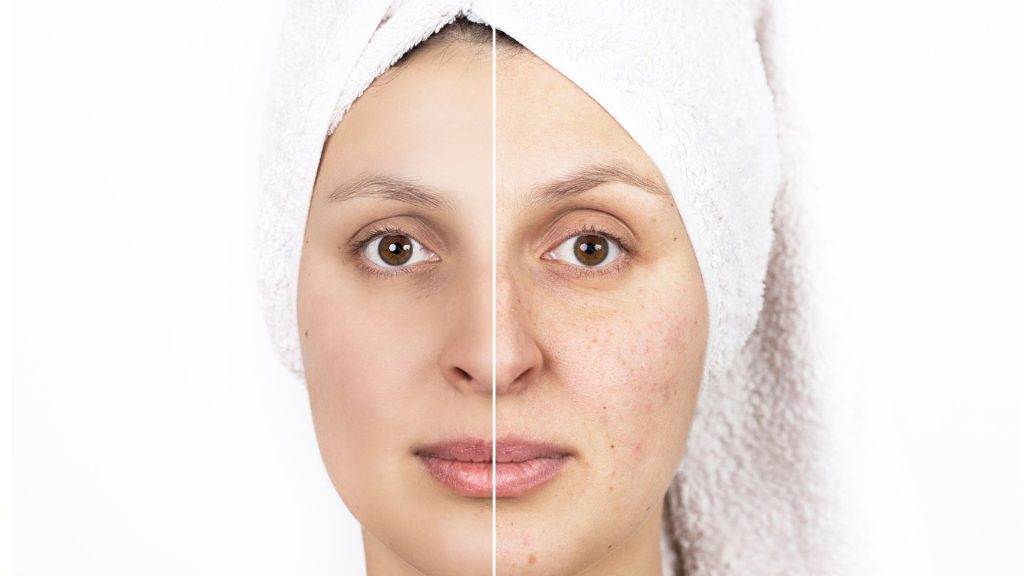How does Biotin help to treat acne?

Don’t you get annoyed by acne? Especially when you have a vacation planned or an upcoming special day. It feels like an unwanted guest who JUST WON’T LEAVE! Well, we have a solution for you. BIOTIN! It’s called “Beauty Vitamin” for a reason. Before we delve into How biotin helps to treat acne, we should know why does acne appear? Is this a sign of an unwanted guest or someone who has an underlying meaning to it? Let’s find out.
Possible Causes of Acne
Acne is quite a common skin condition that occurs when hair follicles are clogged with oil, dead skin cells, and bacteria. This leads to acne, blackheads, whiteheads, or cysts, and affects the face, neck, chest, and shoulders. Pimple care should be on top priority when it comes to skin health. The cause of this can be one or more of the following:
Excess Oil Production: Increased sebum (oil) production via the sebaceous glands contributes to clogged follicles and pimples.
Clogged Hair Follicles: When dead skin cells and oil come together, they block the hair follicles, which form blackheads and whiteheads.
Bacteria: The skin bacterium Propionibacterium acnes, which is naturally present on the skin, can multiply in clogged follicles and trigger an inflammatory response, worsening zits.
Hormonal Changes: Hormonal fluctuations, especially at some point of puberty, or menstrual cycles can increase sebum manufacturing and contribute to zits development.
Inflammation: Inflammatory responses inside the skin can worsen pimples and contribute to their redness, swelling, and pain.
Genetic Factors: A family history of acne can increase the chance of growing the occurrence of zits.
Environmental Factors: Certain environmental elements, such as exposure to pollutants, high humidity, and sweating, can lead to zits symptoms.
Avertisement
The relationship between Biotin and Acne
There is a saying that “Too much of anything can harm your mind, body and soul.” But in this context, acne can be caused when there is either too much biotin or insufficient biotin. Let us see how biotin levels can affect acne:
Biotin Deficiency: A deficiency of biotin, may lead to various skin issues, including acne-like symptoms. Biotin is involved in maintaining healthy hair, skin, and nails. When biotin levels are low, it can disrupt the normal functioning of the skin and contribute to the development of acne.
Biotin Excess: Contrariwise, excess biotin intake through supplements or high-dose biotin products can also impact acne development. Some individuals take high doses of biotin for hair, skin, and nail health. However, excessive biotin intake can lead to an imbalance in the body’s natural processes. High levels of biotin can stimulate the production of sebum, the oily substance that contributes to clogged hair follicles and acne development. This excess sebum can potentially worsen acne symptoms or trigger new breakouts.
Avertisement
How does Biotin help to treat Acne?
Biotin works wonders in many ways while treating acne. Not only supplements but there are acne creams, serums, and products which contain biotin. This can be explained by the following points.
Supporting Keratin Production
Biotin is involved in the synthesis of keratin, a protein that could be a key aspect of the skin, hair, and nails. With this, it helps in enhancing the overall health of the skin, which can contribute to a reduction in acne signs and symptoms.
Regulating Sebum Production
By now we have realized that sebum plays a critical role in the cause of acne. It is the oily substance produced by the sebaceous glands. Biotin aids in regulating the manufacturing of sebum. Excess sebum manufacturing can cater to clogged hair follicles and zits formation. By balancing sebum production, biotin can also assist you in the formation of blackheads and whiteheads.
Supporting Skin Barrier Function
Biotin maintains the skin barrier to outside pollutants, microorganisms, and moisture loss. By strengthening the skin barrier, biotin assists in reducing infection and preventing the access of acne-causing bacteria.
Antioxidant Properties
Biotin possesses antioxidant properties that can help shield the skin from oxidative pressure. Oxidative pressure can make contributions to inflammation and harm the skin, which can lead to pimples. By lowering oxidative strain, biotin helps to minimize inflammation and promote a healthier complexion.
Avertisement
Scientific Evidence
A study published in the Journal of Drugs in Dermatology (2018) investigated the consequences of a combination of nutrients and minerals, which include biotin, on a woman suffering from acne. The observation determined that the mixture complement brought about a decrease in inflammatory and non-inflammatory pimple lesions over 12 weeks.
In a case report published in Dermatology Practical & Conceptual (2017), a woman with acne and seborrheic dermatitis was treated with high-dose biotin medicine. The patient showed improvement in both acne and seborrheic dermatitis symptoms after 3 months of treatment.
Another study published in the Journal of Clinical and Aesthetic Dermatology (2016) evaluated the effects of a dietary supplement containing biotin, zinc, and other ingredients on acne. The study participants experienced a reduction in inflammatory and acne lesions after 3 months of supplementation.
Avertisement
Recommended Dosage
The recommended daily intake of biotin for zits treatment or overall wellness varies depending on factors together with age, sex, and individual needs. The following pointers provide a preferred reference:
Adequate Intake (AI): The AI for biotin mounted through the Food and Nutrition Board of the Institute of Medicine is as follows:
Infants (0-6 months): 5 micrograms (mcg)
Infants (7-12 months): 6 mcg
Children (1-3 years): 8 mcg
Children (4-8 years): 12 mcg
Children (9-13 years): 20 mcg
Adolescents (14-18 years): 25 mcg
Adults: 30 mcg
Avertisement
Possible side-effects
Excessive intake of biotin supplements can result in:
Acne Flare-ups: In rare instances, high-dose biotin supplementation can exacerbate zits’ signs and symptoms or cause new breakouts. This is thought to be associated with the stimulation of sebum manufacturing.
Interference with Laboratory Test Results: Biotin supplementation can interfere with sure laboratory check outcomes, which include those used to measure hormone degrees or thyroid traits. It is beneficial to tell healthcare carriers about any biotin supplementation if present process clinical checks.
Allergic Reactions: Although rare, hypersensitive reactions to biotin supplements can arise. Symptoms can also consist of rash, itching, swelling, or issue respiration. If you experience any destructive reactions then seek medical attention.




Responses